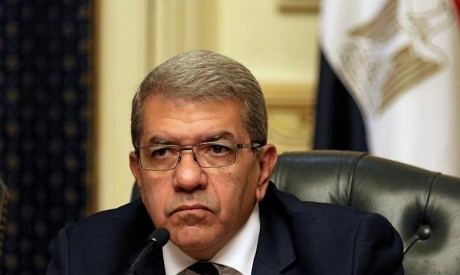Minister of Finance, Amr Al Garhy, referred to the economic performance indicators within the first-half of 2016/2017. He said, the total deficit declined to a 5.1 percent compared to a 6.2 percent within the same period of last year. The revenues recorded EGP 220 billion, increasing by a 14.5 percent. The costs declined to a 9.9 percent compared to a 23.4 percent within the same period, which show there is a control on the spending significantly. The minister asserted that the next four years will witness a decline in the total deficit and, thus, a decline in the public debt which activate the monetary policy and reduce inflation rates. The ministry aims to increasing the revenues, reducing the costs, increasing the foreign investments, and reaching subsidies to their beneficiaries in the current budget.
The minister referred to some of the achievements within last period as follow:
- Issuing the executive regulation of the added value tax law within few days after it has been submitted to the State Council. It included a new tax system for micro projects and SMEs as a kind of attraction to be part of the official economic system. Also, the income tax law will be amended within the new investment law to absorb the new investment incentives, range between a 40 percent for Upper Egypt governorates, and a 30 percent for Cairo and Lower Egypt, presenting a tax exemption for 7 years since the project is kicked off. The tax revenues have increased from EGP 138 billion, a 12.1 percent, to EGP 155 billion, a 15.5 percent of GDP while the tax revenues from the Non-sovereign bodies reached a 12 percent.
- The comprehensive healthcare project will be finished within one month in preparation for presenting the draft law to the parliament. The minister asserted that the allocations of health insurance increased to EGP 3 billion within the current year, also, the health insurance’s fees in schools increased from 12 pounds to 15 pounds. Further, the next period will witness a new increase in the amount allocated to the treatment at state expense, in addition to a new law for health insurance adopted by the parliament with new financial allocations reaching EGP 3 billion.
- The social protection system keeps ongoing and the beneficiaries from ‘Takaful and Karama’ programmes are increasing. The social solidarity’s pensions amount to EGP 7.1 billion and the payments allocated to ‘Takaful and Karama’ programme reach EGP 4.1 billion. It’s decided to increase the allocations of this project to EGP 2.5 billion within the current fiscal year due to the increase of registered people.
- The decision of increasing the pensions and raising the minimum limit for any pension less than 500 EGP, and the preparation for implementing a new system for pensions to meet the aspirations of Egyptian people. The supply commodities’ subsidies will increase from EGP 42 billion to EGP 53 billion. The current economic reformation system contains programmes for social protection to ensure the ongoing subsidy offered to the most favored groups. The subsidised supply commodities per capita increased from 15 pounds to 21 pounds. Moreover, the financial values of the agricultural crops have increased besides implementing a new programme for filtering the supply cards to ensure the subsidy reach its beneficiaries.
- Starting the promotion for the Dollar bonds in some countries including UAE, England, and USA, and carrying out business visits for more than 80 investing and global enterprises for presenting the economic reforms to attract much more of investors and obtain around EGP 2.5 billion from these bonds. The ministry has already received purchase orders from some global investors.
- IMF programme contains a 3 Year Loan equals to Egypt’s portion in the Fund with a grace period of four years and half, to be repaid over 10 years, and an interest rate ranges from a 1.5 percent to a 1.7 percent.
- The energy subsidy will be decreasing gradually on 3-5 years. The wages bill decreased from 8 percent (two years before) to a 6.8 percent of GDP. The social protection programmes are increased; Pension system is reformed and the financial performance of economic bodies is reviewed.
- The industrial licenses law and the bankruptcy law will be issued within the next period. Also, new plans for increasing the imports and empowering the woman are set.
- The average price of Dollar within the last month will be traded starting from next February for one month. Also, financial overlapping worth of EGP 25 billion were resolved, and 1800 requests for finishing the tax disputes were received.
- The ministry’s efforts to rationalize the governmental spending through the governmental financial management information system (GFMIS), to control over the payments, make sure that there are no overflows in the payment than what is listed in the budget, transferring the private accounts in the accounting units to the unified treasury account, cancelling the dealing with the paper checks to control over the operations of payment beyond the limits of the budget.
- The minister asserted that November and December witnessed pumping new investments involving treasury bills and bonds exceeding EGP one billion. The global reports referred that Egypt is moving on the right path of an economic reform, which will take three years to fruit. Egypt then will be one of the most important attractions to foreign investments in the region.
- The government targets Egypt to be present permanently for the foreign investors. The minister found in his recent visit to South Africa that the investor’s view to Egypt has changed, and new investments were pumped into Egyptian market exceeding EGP one billion within last November and December. The minister added that the second half of the current fiscal year will witness many challenges including the rise in oil prices and the energy subsidy, floating the exchange rate, importing a large part of oil substances, and importing the strategic food commodities.


